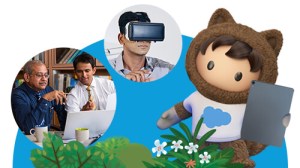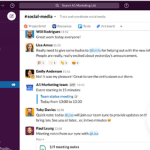The COVID pandemic has drastically accelerated digital transformation. Everything we do—from work and play, to communication, commerce, and consumption—has been transformed by digital technologies.
In the Fourth Industrial Revolution, technology can unlock tremendous value for our societies. But it can also reinforce and exacerbate challenges —unless we commit ourselves to upskilling the workforce, and the critical first step towards upskilling in the digital age is to bridge the digital skills gap.
According to a recent Salesforce-YouGov report, 93% of managers in India believe that COVID-19 has accelerated the need for digital skills in their organisation. However, the same proportion of managers also believe that there are barriers to acquiring digital skills.
To gain some insights on how to overcome these barriers, Salesforce recently hosted a panel discussion on ‘Bridging the digital skills gap in the Asia Pacific region’, featuring industry thought leaders and government experts from the Asia-Pacific region, including:
- Ved Mani Tiwari – COO, National Skill Development Corporation (NSDC), India
- Patrick Kidd – CEO, Digital Skills Organisation, Australia
- Terence Chia – Cluster Director, Human Capital Cluster, Digital Industry and Talent Group, Infocomm Media Development Authority (IMDA), Singapore
- William Sim – VP, Trailhead Academy (APAC), Salesforce
Here are a few key takeaways from the session that are particularly relevant to India.
Digital skills are now survival skills
The digital skills gap was traditionally seen through the lens of economic opportunities. If you were digitally savvy, you were likely to get a better job and a better income. But since the pandemic, digital skills have become essential. From finding hospital beds and oxygen for loved ones, to signing up for life-saving vaccines—being digitally connected has made all the difference.
In business as well, companies that were quick to embrace digital transformation and remote work were able to recover faster, and emerge stronger from the pandemic.
As long as COVID-19 is around, disruptions to work will continue. So, we must find ways to disaggregate our value chains, and determine which jobs can be done remotely.
The next step is to empower more people to deliver their services remotely through digital. This will require innovative thinking. We’ve already made big strides in areas such as contactless payments—even the local vegetable cart vendor can now transact remotely through digital payment apps.
But what’s most critical is digital access. Governments must ensure that everyone has reliable internet connectivity and an affordable digital device. Only then can we begin to close the digital gap.
The supply of digital skills must match the demand
The good news is that there’s plenty of demand for digital skills. The Salesforce economy alone is expected to enable the creation of 5,48,000 direct jobs and 13,62,400 indirect jobs in India between 2019 and 2024.
To fill these jobs, we need skilled people. That’s why Salesforce Trailhead is taking the initiative to empower students and aspiring professionals with the in-demand digital skills that will set them up for a successful career.
Salesforce strongly believes that access to quality training shouldn’t be based on your propensity to pay for it, but simply your propensity to learn. Therefore, all Trailhead courses are available for free. All you need is an internet connection.
Trailhead also works with not-for-profit organisations and universities across India to ensure that students have equal access to digital skilling programs in tier 2 and tier 3 cities.
Our end goal isn’t just to train or upskill individuals, but to place them within our global ecosystem of customers and partners. It’s a win-win for everyone. Aspirants can connect to exciting job opportunities within the Salesforce economy. Meanwhile, our customers and partners gain access to a talent pool of qualified Salesforce professionals.
Both public and private sectors have a role to play
Solving the digital skills challenge requires the collective efforts of governments, businesses, and NGOs.
In 2008, India’s Ministry of Finance set up the National Skill Development Corporation (NSDC) as a public-private partnership entity. Today, NSDC, working under the aegis of the Ministry of Skill Development & Entrepreneurship, has incubated various models of training and skill development. NSDC’s ‘Skill India’ portal enables anyone to sign up for skills training, identify a suitable course, locate the nearest training centre, get certified, and find employment opportunities.
But this is just the beginning. We need to create the right public-private forums where companies can voice their challenges, concerns, and solutions around digital skilling. They need to feel confident that the government’s skilling programs are up-to-date with industry demands and digital requirements.
Governments would also do well to provide attractive incentives for digital skilling initiatives. In fact, 57% of Indian managers believe that the government needs to provide more support for small and regional businesses to embrace digital technology, and reskill/transition their workforce.
Businesses, in turn, must be willing to share information about digital technologies and skills, while working closely with governments to create positive impact. When everyone works together, we can achieve much more than any of us can do alone.
Digital skills development must be holistic
In the digital age, hard technical skills like software programming, data science, and web/ app development will continue to be important. But as AI and automation take over more tasks, soft skills will become more sought after. These include the ability to think critically, communicate well, adapt quickly to challenges, and drive creative solutions.
The successful digital professionals of the future will need both hard and soft skills to do their best work and access the best opportunities. That calls for a holistic approach to digital skills training.
Digital now pervades every industry—including those that were traditionally non-tech. Even skills training is benefiting from digital technologies. During the pandemic, when face-to-face training was impossible, augmented and virtual reality tools helped many professionals upskill remotely, improve hand-eye coordination, and adapt to an automated future.
All of this goes to show that digital is the future. The faster we close the skills gap, the better positioned we will be to thrive in the Fourth Industrial Revolution.
Download the Salesforce-YouGov Digital Skills India report to access more insights on the current status and future outlook for India’s digital skills training.





















